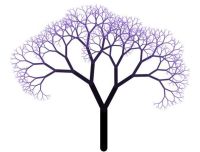For many, learning about their family tree can be a real joy and pleasure.
Realising that a long distant grandfather was in the guild of barber-surgeons, or that you have a criminal or judge or, heaven forfend, someone famous in your lineage, can be a real thrill, and provide you with significant ego-boost, or perhaps a nice feeling of belonging.
The reason why it’s so often a positive experience, is due to an interesting mathematical oversight.
What do I mean?

This fractal can teach us something about ancestry: we have more ancestors than we tend to suppose...(image credit: Northwest Liberty School http://nwls.us/)
I mean that people can read anything they want from a family tree, and this is made easy by the exponential nature of ancestry.
Would you find it remarkable for someone to say they were directly descended from Isaac Newton, Henry VIII or even Jesus? Would you think more of them?
What about people who say they are ‘from’ somewhere? – “my family originally come from Brittany…”, or “my family fought in the revolutionary war…”
Analysis…
Now anyone who knows about the maths of ancestry, knows that there is actually very little remarkable about relations with famous people, especially from a long time back. If you have two parents and four grandparents, eight great-grand parents and so on, you can guess the numbers get big quite quickly.
The American revolutionary war was around 230 years ago, so perhaps eight or nine generations[1]. Nine generations back we had perhaps 2^9 (or 512) ancestors, and their folks were probably still around you can add them to the mix (another 1024) giving over 1500 relatives, all swanning about somewhere in the world around the time of the war.
OK, you might want to reduce the number a bit due to some folks appearing multiple times in your tree; (yes, in-breeding happens to all of us), but the number is probably still well in excess of a thousand.
So, with over a thousand ancestors around at the time, the chance of having at least one involved in the war is pretty darn good (especially if you are were born to US citizens). I would argue that for anyone who can trace back three generations (to your eight great-grandparents) in the US, it would be far more remarkable if they didn’t have ancestors that fought in the war.
As you get further back in time, the numbers get more serious. A thousand years back , or forty generations, the straight maths gives 1 099 511 627 776 ancestors. Of course, this is impossible, as there were not enough people in the gene pool; the real number is clearly much lower and this is due to our old friend, in-breeding – where the family tree morphs into more of a family ‘web’ and involves the majority of the (breeding) population of your “gene pool”, the group that share enough in-breeding to behave somewhat like a super-organism. Where cross flow of genes between parts of the pool becomes retarded, (most usually by geographic barriers) the pool may divide and racial difference may develop.
Of course, we live in a time of great ‘connectivity’, and the US is a great example or a melting pot, with a very ‘open’ gene pool. This means that statistically, the chance that all 1000+ of one’s ancestors were around in the revolutionary war is hopelessly optimistic (unless there were special circumstances, like a closed community with a high degree of in-breeding, as may be the case with some religious groups).
So basically, anyone who says their family is all-American, “since the revolution” is being highly selective in their analysis.
Of course, western society does tend to invest much importance in the male line – which is far more specific – and would only give a couple of chaps alive in ~1780, and if you can indeed prove this then the claim may be considered more interesting.
However, the argument that the male line is more important in some way (such as in the forming of character, or of any particular heritable trait) is pretty unconvincing. So even if you can trace a direct male line to Isaac Newton, this is no guarantee that you will pass your physics tests! Any advantages he had, will have been diluted by the 16,000 or so other folks who contributed just as many genes.
The male and female lines can actually be traced (using mitochondrial DNA for the female line and Y-chromosomal DNA for the male line), but though this makes it easier to trace these ancestors, it is perhaps still unwise to assume this line is more important than the thousands of other ancestors.
In the case of the USA, there is another factor, the large family sizes, and the resulting high population growth rate. The population present during the revolution have, by all accounts, been very fruitful. That means that even if you could trace your male line right back to, say, Thomas Jefferson, the chances are, you are not unique.
The Opinion Bit…

- Hard-earned privilege…
I am constantly annoyed by selective analysis of ancestry. I hope that the above simple illustrations alert the reader to this trickery, or at least confirm the reader’s suspicions (or convictions) that much of this is wishful thinking. What is most important to our own ‘value’ in the world is surely what we ourselves decide to do, not what our remote ancestors may have done.
However, I cannot deny that family research is still hugely interesting, even if what it really confirms is that we are all brothers and sisters, and none of us is superior due to our ancestry.
Don’t even get me started on so-called “royalty”!
[1] How long is a generation? http://www.ancestry.com/learn/library/article.aspx?article=11152